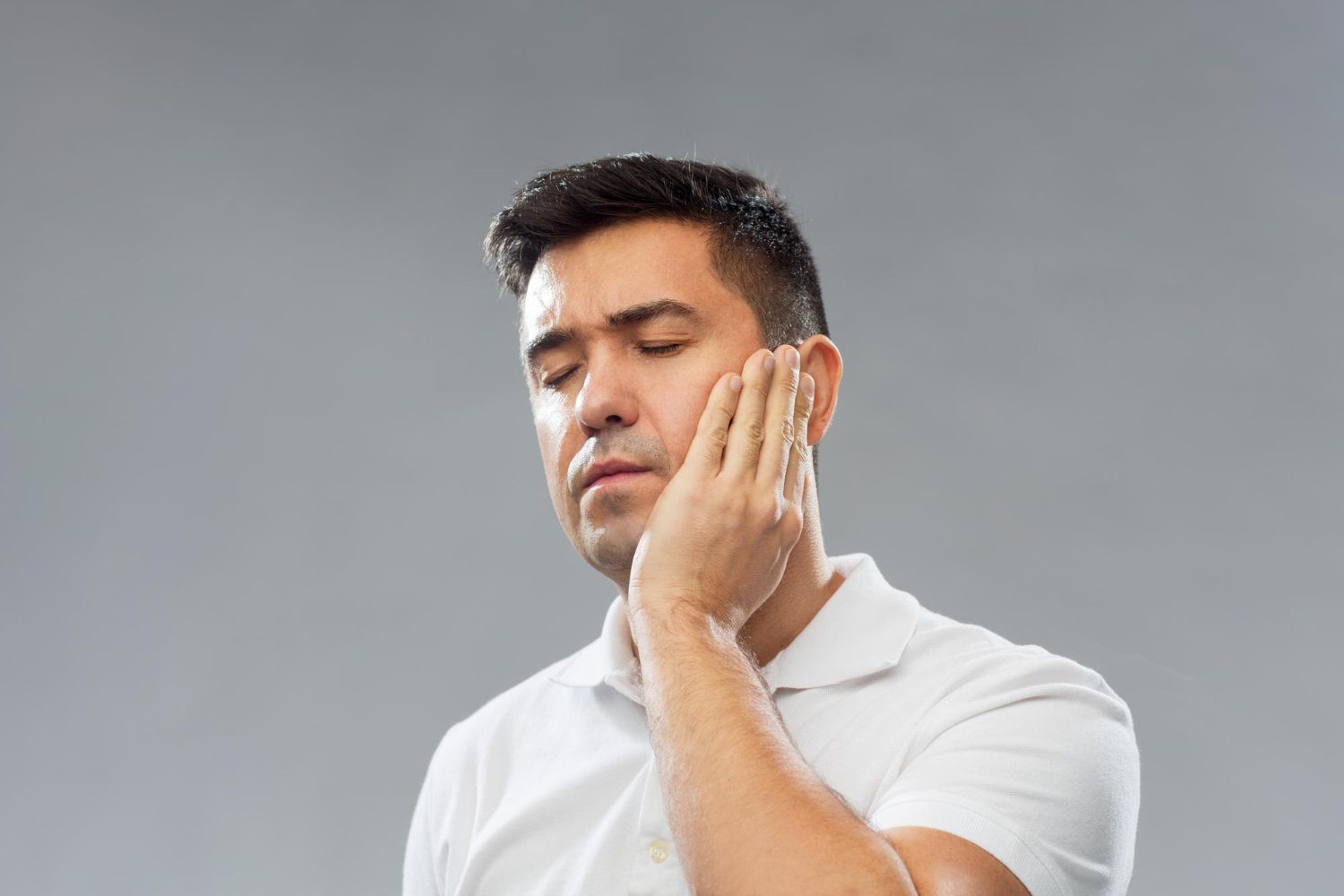How Stress & Anxiety can Cause TMJ Disorder

Relation of Stress and Anxiety with TMJ
The body and brain process particular uncomfortable situations in different ways, including stress and anxiety. We are all familiar with these disorders' effects on each our personal health because we have all had experience with them. It's not particularly damaging to deal with stress and anxiety on occasion, but when they are endured on a regular basis, they can have a negative impact on health in a number of ways.
Contrary to popular belief, stress and anxiety can be the cause of TMJ can alter the body's neuromuscular system by affecting the muscles and joints. This covers conditions like TMJ. TMJ and stress and anxiety affect the jaw muscles and are sometimes known as temporomandibular joint dysfunction (TMJ). You can lower the dangers to your health and enhance your general wellness by learning effective coping mechanisms for stress and anxiety.
What is TMJ?
The temporomandibular joint joins the jawbone to the skull. One is on either side of the face. Jaw muscles, nerves, and tendons maintain the motion of this hinge-like joint, which allows us to chew, yawn, speak, and do other actions. TMJ, or TMD, is a disorder characterized by joint inflammation, which results in the following symptoms:
- Jaw and/or ear pain, ache, or tenderness
- Issues with chewing
- Aches, aches, and pains in the face
- Difficulty shutting or opening the mouth; jaw feels stuck in place
- mouth action and sounds like clicking or grinding
- lockjaw from stress
TMJ is most likely brought on by a number of different circumstances. Stress and worry have the potential to either worsen the illness or contribute to its development.
Stress-Induced Muscle Tension Can Lead to TMJ Disorders
There is no doubt that worry may lead to a TMJ condition. Stress and muscle strain brought on by anxiety can have an impact on the muscles that support your temporomandibular joints. Does anxiety cause TMJ? Yes. Your body's "fight or flight" reaction to a genuine or imagined threat might be triggered by anxiety. Your muscles normally stiffen up in response to threats, but when they remain tense for an extended period of time—as in chronic stress or anxiety—the result is frequent muscle discomfort.
Others may find that stress has a "major" role in their TMJ problems. Stress can influence the development of a TMJ condition by increasing your risk for teeth grinding in addition to causing muscular stress. Stress and worry should always be taken into consideration as potential risk factors when it comes to jaw issues.
TMJ and Anxiety
Many TMJ issues are brought on by a number of different reasons, many of which can interact with one another. An incorrect bite, arthritis (which can impact the joints), teeth grinding, and trauma to the jaw are some of the most important risk factors for TMJ issues. Any of the risk factors can result in a TMJ issue when combined with stress and anxiety.
Muscle discomfort has been associated with melancholy, anxiety, and post-traumatic stress disorder (PTSD), according to a study involving more than 4,000 participants. Why? According to the authors, these problems can lead to aberrant muscular behavior and hyperactivity, worsening pain and inflammation throughout the body. Your TMJ may experience troubles as a result.
How Should Stress- and Anxiety-Related TMJ Be Treated?
Your treatment should be individualized based on the causes of your symptoms because TMJ disorders are complex and can be brought on by a variety of variables in a person's life. TMJ and stress need to be addressed. This usually entails having your dentist check your smile for indications of teeth grinding, an incorrect bite, muscular strain, and other indicators that could indicate the source of your TMJ symptoms.
Due to various distinct symptoms, TMJ dysfunction is connected to anxiety. Anxiety and TMJ often walk hand in hand. A few of these include
Dizziness, since there are nerves and blood vessels that pass through the rear of the jaw, which is where TMJ dysfunction affects, they are connected to a number of odd neurological symptoms. Dizziness is one sign, and it can strike unexpectedly and cause a lot of pain.
Morning headaches are another related symptom. But when you have a headache, the discomfort you wake up with each morning adds to your stress levels. In this scenario, your day can get off to a bad start, and your anxiety might increase as the day goes on.
Pain Additionally, the temporomandibular joint disease can result in pain in the face and jaw. Because of how your body reacts to the stress of ongoing pain, it appears that long-term pain symptoms are linked to jaw pain and anxiety.
Blinking/Clicking Blinking and a jaw-clicking sensation can also be brought on by TMJ problems. Although these symptoms are unrelated, they have been grouped together because they might be startling and scary to those who are unaware they have a TMJ condition. After all, someone who can't seem to stop blinking could be concerned that they have a hazardous condition.
Anxiety and jaw pain can lead to tinnitus. Most people tone out the ringing in their ears caused by tinnitus, but occasionally it can get so loud that it interferes with sleep or causes other distractions. Even though it's unclear to scientists that, why many people with tinnitus appear to experience anxiety.
Additional Neurological Complaints TMJ problem can also result in tingling in the fingers, numbness in the arms or legs, uncontrolled muscular movements, and decreased thinking due to the stress it puts on the nerves. Although some could argue that these are the most bothersome TMJ symptoms, not everyone experiences them.
These are but a few of the signs that anxiety may be impacted by. Despite the fact that anxiety is not now regarded as a direct symptom of TMJ disease, it is also plausible that the same nerves causing the neurological symptoms also directly produce anxiety.
Panic attacks can also happen to people with this illness. TMJ from anxiety symptoms like panic attacks are sometimes brought on by random, unpleasant bodily symptoms. Therefore, those who have TMJ issues and have unexplained dizziness and other symptoms may get panic attacks as a result, and once you've had one, you're more likely to have more of them in the future.
How to Manage TMJ-Related Anxiety
It stands to reason that the more you can manage your TMJ symptoms, the simpler it will be to manage your anxiety. So be sure to discuss the steps you need to take to manage your TMJ condition with our doctor at The Center for Sleep Apnea and TMJ Idaho can help you find TMJ stress relief. We offer TMJ disorder treatment in Idaho.
But keep in mind that while the TMJ problem exacerbates anxiety, the condition itself does not cause the condition. Instead, anxiety is frequently present in people who acquire TMJ and is a subsequent symptom of living with TMJ condition. Simply put, the illness makes anxiety symptoms worse. The TMJ condition and your underlying anxiety must therefore be treated simultaneously.
If your TMJ is caused by stress, you can manage First, be conscious of bad habits like jaw clenching and teeth grinding. You may put an end to these kinds of behaviors by increasing your awareness. Aside from chewing less (avoid chewy, sticky meals), you could also try massaging your jaw and face. To prevent you from grinding your teeth while you sleep, your doctor may also prescribe a nightguard.
Consider your options for reducing stress in your life. Finding the source of your stress can be quite beneficial, whether you need to adjust your lifestyle or consult a counselor about how to handle problems in your life. At the Center for Sleep Apnea and TMJ Idaho, we offer exceptional jaw pain treatment in Boise, Idaho. TMJ and depression need to be addressed urgently, so book an appointment at TMJ clinic in Idaho and let us help you fix TMJ caused by stress.










